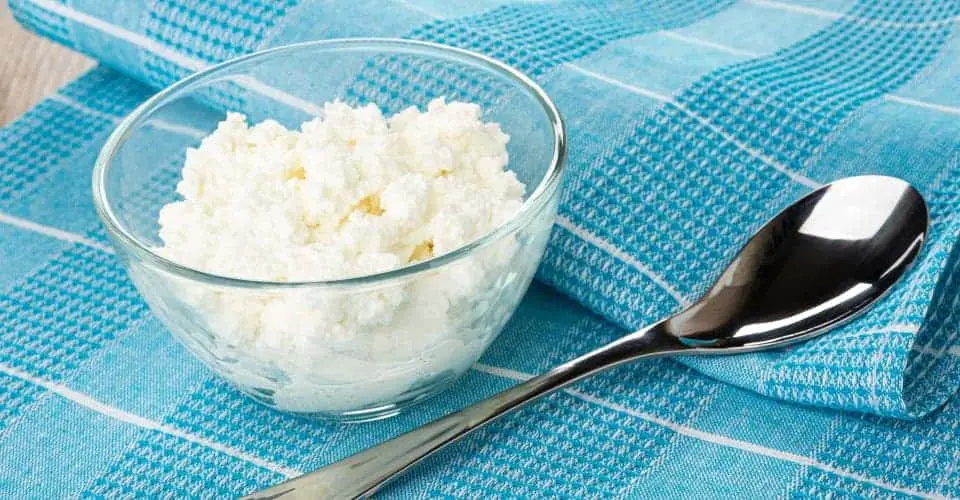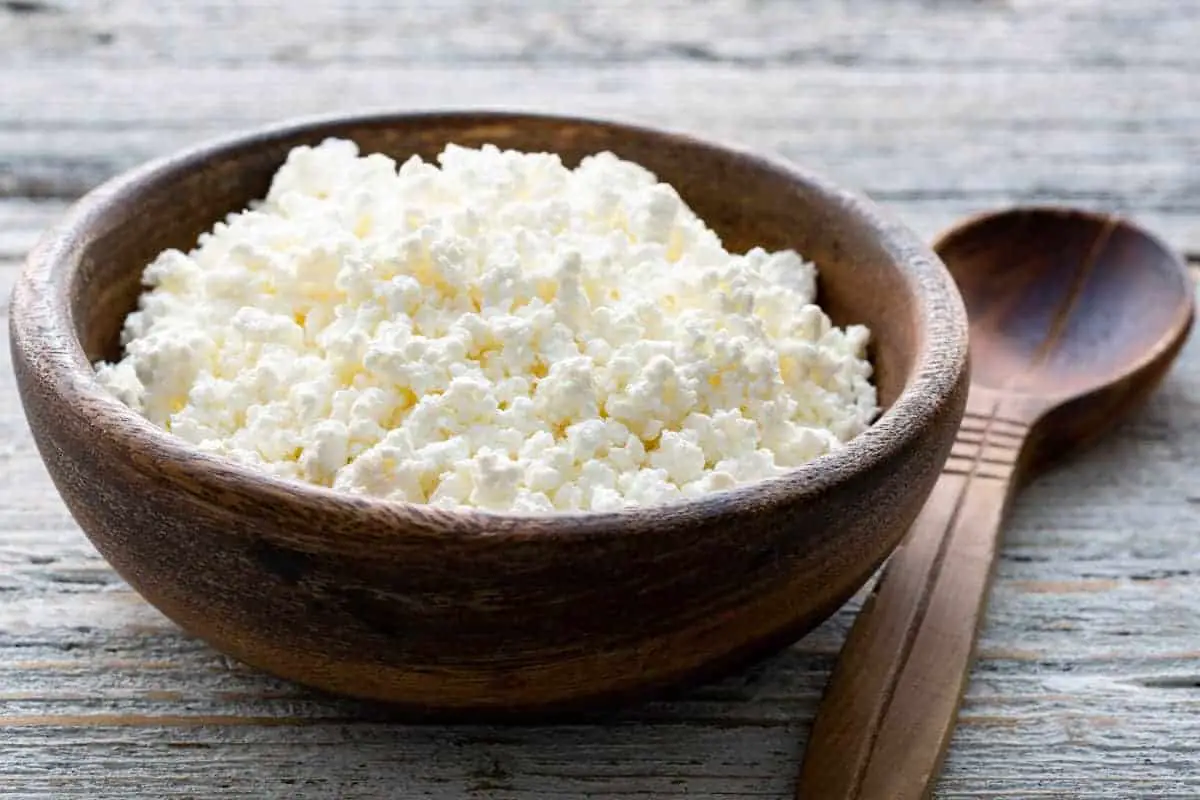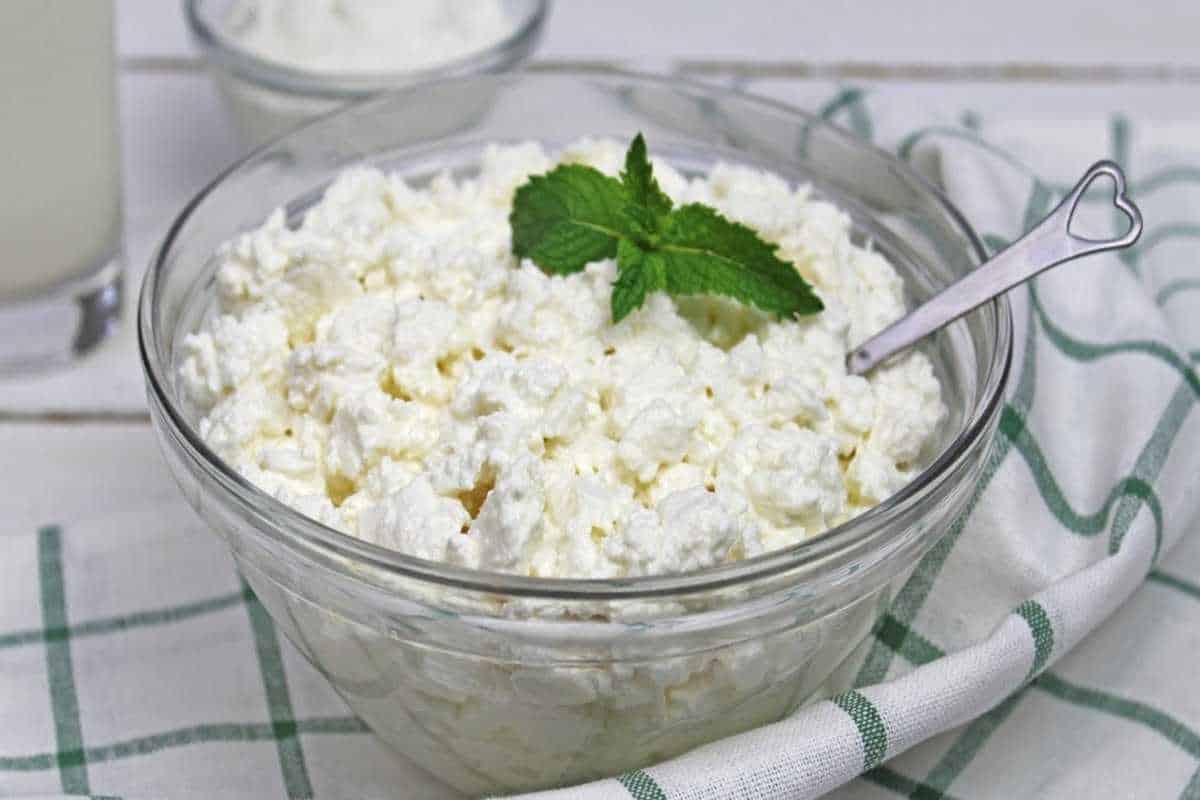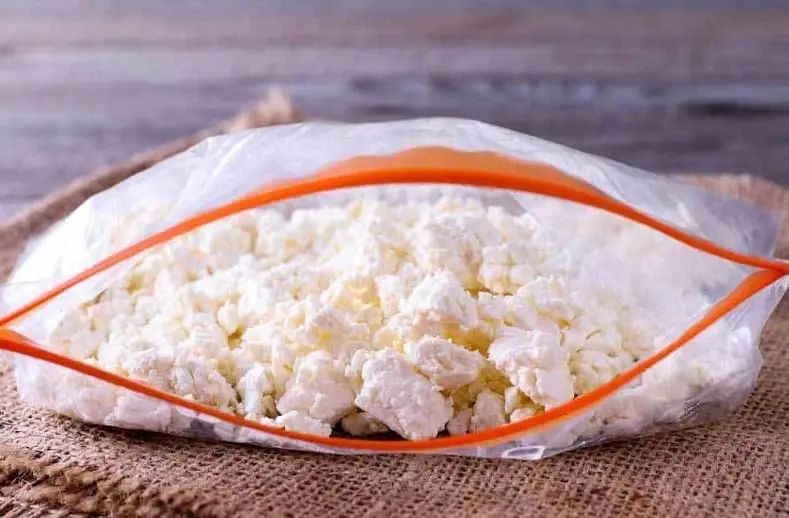Can you freeze cottage cheese? Freezing cheese is possible. Frozen cheese might lose its texture, but it preserves most of its nutrients.
But in general, soft cheeses are challenging to freeze. We will learn how to freeze cottage cheese, its lifespan after being frozen and address some rising questions. Keep reading to find out more!
Recipe With Cottage Cheese

Before freezing your cottage cheese, you should know how to use it later before advancing your steps. As already mentioned, thawed cheese will have a different texture. That means it should only be used on specific recipes. Recipe experts advise that you should consider defrosted cottage cheese in cooked dishes.
You can use defrosted cottage cheeses in making pancakes, cheesecakes, creamy soups, casseroles and pasta, and many others. There are many more uses, but you should only choose a recipe that you are familiar with. Choose your best cottage cheese recipe and make it. Most of these dishes are used for breakfast or as snacks.
We cannot list all possible cottage cheese recipes, but you can always find more popular cottage cheese recipes.
Cottage Cheese Cheesecake Recipe
Ingredients
| Material | Amount |
| Whole egg | 1 |
| Cottage cheese | 1/2 a cup |
| Vanilla extract | 1/2 tablespoonful |
| Sweetener | 1 tablespoonful |
| Protein powder | 1 scoop |
| Greek yogurt | 1 tablespoonful |
| Graham cracker crumbs | |
| Butter |
Method
Put all the ingredients in a food processor or blender and process or blend to fine texture.
Pour the resulting mixture into a pan
Bake on medium to high heat for about 20 minutes
Cool and wrap it up and store in a fridge for a few hours
Mix graham cracker crumbs and butter
Put into the cheesecake and bake at medium to high temperature for about 6 minutes.
Cottage Cheese Pancakes
Ingredients
| Material | Quantity |
| Cottage cheese | 400 g |
| Flour | 1 cup |
| Vanilla extract | 1 tablespoonful |
| Baking powder | 1 tablespoonful |
| Sugar | 2 tablespoonsful |
| Canola oil | ¼ cup |
Method
Mix the ingredients, starting with cheese, eggs, vanilla extract, sugar, baking powder, and flour in that order. Stir every time you add something.
Put canola oil in a skillet and preheat on a medium heat
Fry the cottage cheese pancakes on each side until golden brown.
Serve when hot with maple syrup or jam.
Cottage Cheese Pasta Sauce
Ingredients
| Material | Quantity |
| Cottage cheese | 1 cup |
| Low-fat milk | 1/3 cup |
| Grated parmesan cheese | ¼ cup |
Method
Mix cottage cheese and milk in a blender or processor and blend or process to obtain a fine texture.
Pour in a saucepan and warm over medium-low heat. Add the parmesan when hot and stir and let cook for a few minutes.
Serve when hot.
We cannot list all possible cottage cheese recipes, but you can always find more. Use Google to search for your favorite recipe and make a creamy or yummy dish.
Does Cottage Cheese Go Bad?

Yes. Cottage cheese has the expected shelf life beyond which it is not safe for human consumption. All store-bought cottage cheeses have expiry dates printed on them, and that is influenced by several factors. The processing method, type of cottage cheese, and manufactured date all affect how long it will last before going bad.
Also, the storage conditions will affect how fast it spoils, especially after opening the package. Usually, it takes 7-10 days. After that, you need to dispose of it. You can freeze the cottage cheese to extend its shelf life beyond the shelf life of 10 days.
How can you know that your cottage cheese is spoiled? Look out for the following signs:
- There is mold growth on the cheese itself or on the container. Such cottage cheese should be discarded because it is not safe for human consumption.
- Super chunky cottage cheese or one with a layer of liquid beneath is already spoiled. Do not even think of using it in any way.
- A spoiled cottage cheese lets off an awful smell or simply does not smell fresh.
- If there is a change in taste, then the cottage cheese has spoiled and should never be eaten raw or cooked.
To avoid mistakenly using spoiled cottage cheese, use your sense of sight, taste, and smell. You cannot go wrong if you observe your cheese appropriately before use. If you notice any change in appearance, taste, and smell, just discard it.
How Long Does Cottage Cheese Last?

Cottage cheese is a soft, fresh, uncured cheese that does not last long. Most take about a week once it is opened. You should also read the expiry date printed on the package. It will give you a rough idea of how your store-bought cheese will last.
Cottage cheese is made from milk that has different fat levels, which affects its shelf life. It should be stored in a place with a temperature below 40 Fahrenheit degrees to make them last longer. That should either be in a ridge or a freezer, but these, too, affect its shelf life.
The table below has more information on how long your cottage cheese lasts after the date printed on the package.
| (Unopened) | Refrigerator | Freezer |
| Past Printed Date | Past Printed Date | |
| Cottage Cheese lasts for | 7-10 Days | 3 Months |
| Ricotta Cheese lasts for | 7-10 Days | 3 Months |
| (Opened) | Refrigerator | Freezer |
| Cottage Cheese lasts for | 5-7 Days | 2-3 Months |
| Ricotta Cheese lasts for | 5-7 Days | 2-3 Months |
The data in the table above clearly explains why we need to freeze cottage cheese if we expect to use it at a much later date. With a refrigerator and the package closed, your cottage cheese can last between 7-10 days. Once it is opened, it takes about 5-7 days after the printed sell-by date.
Cottage cheese has a much better shelf life when frozen or kept in a freezer. It can last for three months if the package is closed or between two and three months once the seal is broken. Fortunately, you can still use your cottage cheese even after the best sell-by date, as illustrated in the table above.
Can You Freeze Cottage Cheese?

Yes. You can freeze cottage cheese, but it is a bit challenging. Unfortunately, you have to freeze it properly to achieve its maximum shelf life. Buy a whole fat or large curd cottage cheese and freeze it directly in the container. Low-fat cottage cheese is more difficult to freeze and should be avoided if possible.
Cottage cheeses are better frozen in an airtight bag, usually the freezer bag. Place the cottage cheese in it and remove excess air by squeezing the bag and then sealing it. We will talk more about freezing cottage cheese in the next section.
Like all other dairy products, freezing and thawing will change the consistency of cottage cheese. It will not look as appealing or tasty after defrosting as it was before. The structure will also be changed, but that is not a big concern since it will be altered in the recipes anyway. You should only worry about the taste that is likely to change. Fortunately, many recipes require thawed cottage cheese.
How To Freeze Feta Cottage Cheese?

Can you freeze cottage cheese? Yes, you can. However, the method that you will use depends on the type of cottage cheese. In this case, we will talk about freezing feta cottage cheese.
A feta cottage cheese is a soft, salty, white cheese, usually made from sheep’s or goat’s milk. It has a tangy sharp taste that ordinary cottage cheese does not have. Feta cheese can be rich in sodium, which gives it a salty taste. So, how do you freeze it? What are the steps?
The following are the steps you need to freeze feta cheese:
- Start by cleaning your hands and drying them properly before handling the feta cheese you want to freeze.
- Take out the feta cheese from its usual brine solution storage and remove the excess water by parting it with a clean kitchen towel.
- Before moving to the next step, you should cut the cheese into smaller pieces for the intended use after freezing.
- Pack the sliced pieces in plastic food wrap. Remove as much air from the wrap as possible and seal it before putting the package in a freezer.
- If the feta cheese is cut into small cubes, spread them on a baking sheet to form one layer for initial freezing. The sheet should have a parchment, wax, or foil lining. Once completed, double wrap the package for further freezing.
- Write the current date on the package. You should keep your eye on the date because frozen feta cheese should be used within 2-3 months.
How Long Does Cottage Cheese Last In The Freezer?

It will take 2-3 months in the freezer, after which it should be removed and used. If the frozen cheese is sealed, it can safely stay in the freezer for 3 months. Find more information from the table in the previous section.
How To Defrost Cottage Cheese?

Using frozen cottage cheese straight from a freezer is not recommended. Instead, you need to defrost it. That can be done in any of the following ways:
In the Fridge
Place the frozen cheese in a fridge at least a day before using it. But if you want it defrosted overnight, submerge in cold or lukewarm water. Water conducts heat faster than air, making the defrosting quicker.
On the Counter
If you have just realized that you need to use your frozen cheese and you need it defrosted faster, this method may serve you right. However, it will still take you between 2-4 hours. It is not the best approach and should only be used if there is no time to use other options.
Put the container with frozen cheese in a bowl or a larger container with lukewarm water. Set it on the counter and sit back. To fasten the process, change the water every 30 minutes when it becomes ice-cold. The method is only recommended if you need the defrosted cottage cheese cooking or baking.
Use it Frozen
There are some dishes or recipes where frozen cottage cheese can be used without the hassles of defrosting it. Smoothies or any other recipe where ice cubes are required can go well with frozen cottage cheese. You only need to use fewer ice cubes.
Tips For Using Frozen and Thawed Cottage Cheese?

You can use frozen or thawed cottage cheese in many ways, including, but not limited to the following:
Use frozen cottage cheese only on recipes you know perfectly well
That way, you will be quick to make necessary adjustments to get the expected consistency and texture. And if anything goes wrong, you will know what to blame.
Use it in cooked dishes
There is a significant change in the texture of cottage cheese after freezing. That is why it is advisable to use it only in cooked dishes.
Drain the excess liquid
Defrosting can result in your cheese floating in a pool of water. Drain that excess liquid away before using it for the intended purpose.
Make it airtight
Before freezing a cottage cheese, you need to remove excess air and seal the container. You can consider using cling film or foil to make it airtight if in doubt.
FAQs
Signs That cottage Cheese Has Gone Bad?
Bad cottage cheese will have a change in color, smell, and taste. The cheese will turn yellowish, emit a damp scent, and start to crack or split. It might also become chunky or have excess water underneath. Another common sign is mold growth on the cheese or on the container. Spoiled cottage cheese should be discarded.
How to eat cottage cheese?

Cottage cheese is commonly used in different recipes and many other ways, including the following:
- Pancakes or waffles
- Salads
- Mixed with fruits such as berries, sliced bananas, melon chunks, etc.
- Granola
- Sour cream substitute
- Dipping sauces
- Smoothies
- Toast
- Baked goods
- Mayo substitute
- Scrambled eggs
- Lasagna, etc.
Summary
Cottage cheese is packed with nutrients. Unfortunately, it is highly perishable, and its shelf life can only be extended through freezing. Frozen cottage cheese in a freezer can last for up to three months, after which it should be used. Otherwise, its structure consistency will continue to degrade.
Cottage cheese should only be used when it is still fresh. If spoiled, it will turn yellow, grow mold, become chunky, smell damp, and have excess water. Such cottage cheese should be discarded. It is recommended to defrost a frozen cheese before using it. Also, consider it for cooked or baked dishes. So can you freeze cottage cheese? The answer is yes.
